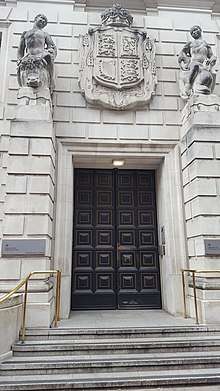Department for International Trade
The Department for International Trade (DIT[1]) is a United Kingdom government department responsible for striking and extending trade agreements between the United Kingdom and non EU states (however the UK Government is not legally permitted to negotiate any trade deals with third party countries before exiting the EU in 2020), as well as for encouraging foreign investment and export trade.[2] The department was created by Prime Minister Theresa May, shortly after she took office on 13 July 2016, following the United Kingdom's vote to leave the European Union.[3]
 | |
| Department overview | |
|---|---|
| Formed | 14 July 2016 |
| Preceding department | |
| Jurisdiction | United Kingdom |
| Headquarters | 3 Whitehall Place, London, SW1A |
| Minister responsible |
|
| Department executives |
|
| Child department | |
| Website | Official website |
DIT's purpose is to develop, coordinate and deliver a new trade policy for the United Kingdom, including preparing for and then negotiating free trade agreements and market access deals with non-EU countries. The new department is a specialised body with significant new trade negotiating capacity.
It took on the responsibilities of UK Trade and Investment, which was previously operated by both the Foreign and Commonwealth Office and the Department for Business Innovation and Skills, it also took on the latter's other relevant trade functions; as well as responsibility for UK Export Finance.[4] It is overseen by the Secretary of State for International Trade, currently Liz Truss.[2]
As of February 2017 the department employed about 200 trade negotiators.[5]
The UK Trade Remedies Authority (TRA) was set up to protect Britain from unfair global trading practices after Britain left the EU. It was intended to be a separate department, but as of April 2019 continued to be a "shadow organisation" within the Department for International Trade. In October 2018 Sir David Wright was designated to head it,[6] but in April 2019 he withdrew.[7]
The TRA was expected to be a key part of Britain's drive to expand world trade after leaving the EU. It was intended to propose measures to limit the importation of goods subsidised by foreign governments in detriment of British producers, and oppose tariffs imposed elsewhere on British imports.

Ministers
The Ministers in the Department for International Trade are as follows:[8]
| Minister | Rank | Portfolio |
|---|---|---|
| The Rt Hon. Liz Truss MP | Secretary of State President of the Board of Trade Minister for Women and Equalities |
|
| The Rt Hon. Greg Hands MP | Minister of State for Trade Policy | export controls, WTO relations, tariff policy, securing new free trade agreements |
| The Rt Hon. The Lord Grimstone of Boscobel | Minister of State for Investment (Jointly with BE&IS) |
|
| Graham Stuart MP | Parliamentary Under Secretary of State for Exports | Export policy and strategy, UK Export Finance, Department's Defence & Security Organisation, trade missions |
| Kemi Badenoch MP | Parliamentary Under Secretary of State for Equalities (Jointly with HM Treasury) |
|
| The Rt Hon. The Baroness Berridge | Parliamentary Under Secretary of State for Women (Jointly with Education) |
|
| Ranil Jayawardena MP | Parliamentary Under Secretary of State for Trade Policy | future and continuity trade agreements, barriers to market access, trade remedies, trade dialogues |
See also
References
- "Department for International Trade". GOV.UK. GOV.UK. 28 July 2016. Retrieved 28 July 2016.
- "About us - Department for International Trade". GOV.UK. Retrieved July 14, 2016.
- CSW and Politics Home staff (July 13, 2016). "Theresa May signals Whitehall rejig with two new Cabinet posts". Civil Service World. Retrieved July 14, 2016.
- "Machinery of Government Changes:Written statement - HCWS94". UK Parliament. July 18, 2016. Retrieved July 22, 2016.
- Trading places / Negotiating post-Brexit deals. Economist, February 4th-10th 2017, page 25
- Department for International Trade (26 October 2018). "Chair and Chief Executive Designates appointed to UK Trade Remedies Authority". UK Government. Retrieved 3 April 2019.
- Richard Partington (3 April 2019). "Blow to UK global trade as new watchdog chief quits before launch". The Guardian.
- "Our ministers". GOV.UK. Prime Minister's Office, 10 Downing Street. Retrieved 1 August 2019.
External links
.svg.png)
.svg.png)